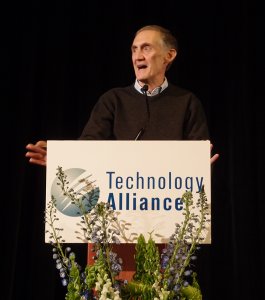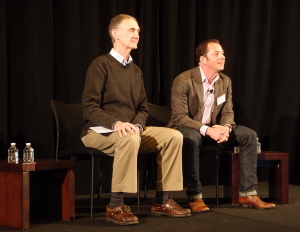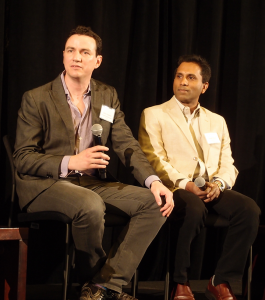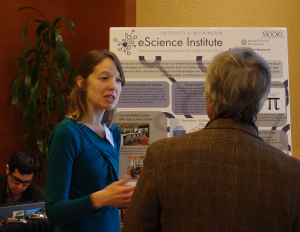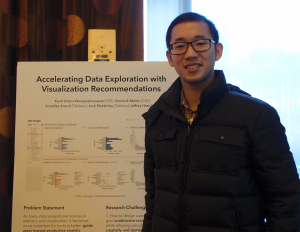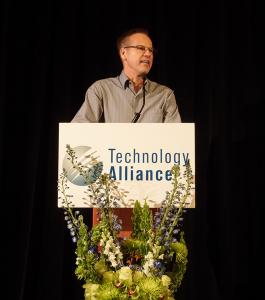On Tuesday, UW CSE, the non-profit Technology Alliance, and more than 150 business and research leaders participated in a day-long conference, “Insight to Impact: Transforming Washington’s Industries Through Big Data,” that examined the role of data science, sensing, machine learning, and data visualization in driving our economy. From optimizing airline routes and building efficiency, to personalizing health care and retail customer interactions, it is clear that our region has the infrastructure and expertise to take full advantage of rapidly expanding opportunities in big data.
The Ever-Expanding Sphere
UW CSE’s Ed Lazowska kicked off the program with an overview of the big data ecosystem, including how big data is enabling computer scientists to “put the smarts in everything” and empower people to put data to work for the civic good.
Characterizing computer science as an “ever-expanding sphere,” Ed pointed out the many ways the field is enabling the things that people care about. These include personalized recommendations, fraud detection, predictive pricing, real-time traffic guidance, and a host of other applications that are driven by big data infrastructure and services – many of them based here in Washington State.
The Democratization of Data
It is no surprise that Seattle is the epicenter of the big data revolution: it is home to Amazon Web Services and Microsoft Azure, two of the biggest cloud computing platforms in the world that enable big data, and UW CSE and the UW eScience Institute have built up critical expertise and launched new educational programs on the Seattle campus to stay at the forefront of the big data revolution.
Our region is also home to Tableau Software, the rapidly growing company that brought big data to the masses through user-friendly visualization tools. Tableau’s Vice President of Product Management, Francois Ajenstat, explained how Tableau’s tools empower people to work with their own data and share their findings with the world.
Big, and Getting Bigger
Ewan Duncan from McKinsey & Company quantified Washington’s present leadership in big data and the future economic opportunity. He noted that Washington owns 40% of the cloud computing market and ranks second among its peer states, as defined by the Technology Alliance, in both venture investment in big data companies and the percentage of total state employment in big data fields.
On the flip side, Washington ranks low in production of graduates to fill these jobs – a situation we need to rectify in order to maintain our leadership position in the future.
According to McKinsey, the payoff could be huge: the firm estimates the global market for big data technologies to grow to between $24 billion and $45 billion by next year, and productivity gains and cost savings as a result of big data innovations in the U.S. alone to reach as high as $610 billion by 2020.
UW CSE’s Carlos Guestrin, who is also CEO of machine learning startup Dato, is particularly bullish on big data’s potential. In a panel discussion that followed the McKinsey presentation, he proclaimed 2015 as “the year intelligent applications transform how we interact with the world” and emphasized that we need two things to succeed in big data: talent (“We can’t mint these people fast enough!”) and tools.
Carlos was joined onstage by Madrona Venture Group’s Matt McIlwain, Joseph Sirosh of Microsoft, and panel moderator Dina Bass of Bloomberg News. All of the panelists were enthusiastic about the opportunities for our region when it comes to big data.
Matt highlighted opportunities up and down the stack, from enabling infrastructure, to data intelligence, to the development of data-driven applications and services, and he suggested that Seattle was a particularly attractive place for startups working in the last category. Joseph followed this up by noting that Microsoft has the muscle to build platforms at scale, upon which others can build.
Carlos noted that the market for data intelligence and machine learning is nascent and evolving, but that startups operating in this space have an advantage in their ability to be agile. When asked why he thought Seattle is the place to be for big data, Carlos observed, “There is a tremendous amount of energy, a tremendous amount of vision, and a real sense of going places.”
Spotlight on UW Research
Several UW CSE researchers, joined by colleagues representing interdisciplinary efforts from across campus, were on hand for a poster and demo session. Members of the audience had a chance to interact with the individuals doing cutting-edge research in a variety of fields either driving or driven by big data.
Mayank Goel and Edward Wang of the UbiComp Lab and Kanit “Ham” Wongsuphasawat and Dominik Moritz of the Interactive Data Lab represented UW CSE. The university’s multi-disciplinary initiatives were also well-represented by Sarah Stone of the eScience Institute; Jess Hamilton of the College of Built Environments; Tyler McCormick of the Center for Statistics and the Social Sciences; and Jevin West of the iSchool.
The breadth of projects featured during the session served to illustrate the increasing importance of big data in advancing innovation across a variety of fields, including medical diagnostics, scientific discovery, global development, public utilities management, and urban planning.
Getting Vertical
The remainder of the day was spent examining how specific industries are putting data to work to deliver better service, cut costs, and spawn the emergence of whole new industries, including deeper dives on big data in aerospace, retail, health care and building management.
Bryan Mistele of Inrix delivered a keynote on the growing use of data in the automobile industry and traffic management. Later, UW CSE alum Jeremy Jaech, CEO of SNUPI Technologies – a company spun out of UW CSE – took to the stage to explain how low-cost sensors are enabling the collection of new categories of data that inform the development of exciting new applications, such as systems for creating a “smart home.”
The afternoon culminated in a closing keynote by Matt Wood, general manager of data science at Amazon Web Services, which brought home the recurring theme of the day: our region’s indisputable leadership in big data.
UW CSE is proud to be a big part of that.
Read more about the McKinsey report on Washington’s leadership and opportunity in big data here.
Read an excellent summation of the session on big data in aerospace here.
Learn more about the event here.


